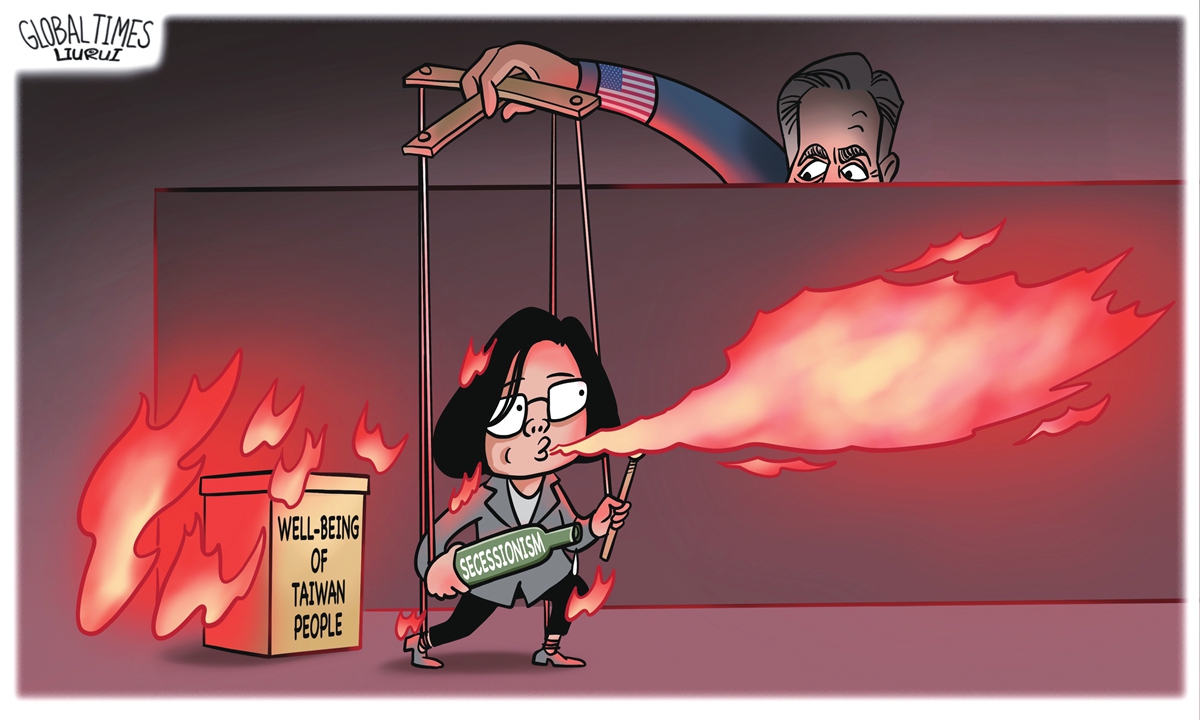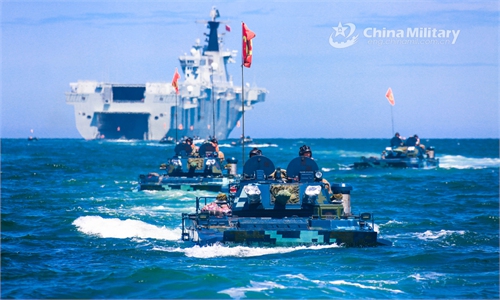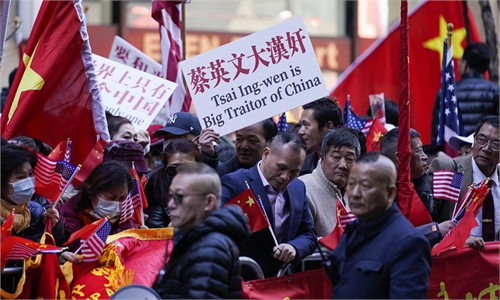
Fiery puppetry. Illustration: Liu Rui/GT
Under the guise of "transiting" through the US, regional leader of China's Taiwan Tsai Ing-wen had a "meeting" with US House Speaker Kevin McCarthy amid protests in Los Angeles on Wednesday local time. Although Tsai and McCarthy boasted that the bonds between the two sides had "never been stronger" and "Taiwan is not isolated," it was clear that those words carried little weight. Especially for Tsai, they perhaps have no effect other than cheering herself on. A poll within the island of Taiwan shows that nearly 70 percent of Taiwan residents don't think Tsai's trip will help the island's relations with the US, which is undoubtedly a very blunt response.Contrary to Tsai's expectations, more people are concerned about what risks her provocative move to collude with the US and "rely on the US to seek independence" will bring to Taiwan. The meeting also showed the world what "relying on" exactly means in the phrase "relying on the US to seek independence" - those who betray their country cannot have dignity in front of Washington politicians like McCarthy, and without integrity, they can only "rely on" others. It is evident that McCarthy allowing Tsai to "rely on" himself is only a temporary move. Moreover, it is with ulterior motives and is ultimately unreliable. McCarthy wanted to "top up his political career" by provoking other countries to create the risk of conflict. But if it transcends the scope of risks that the US can bear, a more likely result will be a continuous devaluation of his political career until bankruptcy. At that time, his only option is to abandon Tsai like an old shoe.
To be frank, Tsai, who behaves sneakily, had a pretty miserable trip this time. She originally intended to gain some so-called political capital for herself and help boost the sagging situation of the Democratic Progressive Party in local elections through her US "transit." Unfortunately, she was "cold-shouldered" at many events in New York. The demand by the US side for Tsai to keep a low profile and remain secretive not only fully exposed her political nature of "relying on the US to seek Taiwan independence," and "flattering the US to sell out Taiwan," but also provided a firsthand example of the predicament of becoming a pawn for the US to play the "Taiwan card." The "historic" meeting with McCarthy lasted less than two hours, which only nailed her to the pillar of historical shame.
As we all know, avoiding war and seeking peace is the mainstream public opinion on the island. Tsai's cooperation with the US' political agenda and provocations will only bring about another round of conflicts and crises. In the eyes of the US, Taiwan is essentially just a pawn that is used to contain China's development, and no matter how many beautiful words US politicians may say, what they care about the most is their own interests. When it comes to interests, there are various calculations and comparisons based on their own needs, and the well-being of the people of Taiwan as well as the destiny of the island will inevitably be sacrificed. It is a pipe dream to seek peace and avoid war in the US chessboard. This is why Tsai's trip to the US was met with indifference and condemnation on the island.
On the contrary, former Taiwan regional leader Ma Ying-jeou's visit to the mainland during almost the same period as Tsai's "sneaky transit" in the US has received completely different attention and evaluation. Many foreign media outlets also noticed the stark contrast between the two. When Tsai acted like a rat crossing the street, humbly begging for a meeting with her foreign master during her sneaky transit, Ma, "a Xiangtan boy" as Ma called himself in the local dialect, received a warm welcome from his mainland compatriots. Compared to Tsai's upsetting experiences in the US with full political calculations, what Ma felt on the mainland was the warmth of "people on both sides of the Taiwan Straits are of the same family." Tsai's "sneaky transit" in the US was aimed at using foreign forces to cut off the blood ties across the Straits, while Ma's "roots-seeking journey," as the name suggests, is an action to show all Taiwan residents that Taiwan's roots lie in the mainland, and that compatriots on both sides of the Straits are Chinese.
Tsai is a disloyal descendant, while Ma is a returning hometown man. One is on a dead-end path, while the other is on the right path. Which one is popular and what the overall trend of history is are all revealed in these comparisons.
The meeting between McCarthy and Tsai also reminds us that in the great journey of national reunification and rejuvenation, there are internal secessionists waiting for an opportunity to take action and external forces trying to avail themselves of every opportunity to interfere. This is why China, while striving for a peaceful reunification with the greatest sincerity and utmost effort, makes no promise to give up the use of force and retains the option of taking all necessary measures.
Every so-called breakthrough made by the collusion between the US and Taiwan island will be met with our resolute countermeasures to ensure that their losses outweigh the gains. Just like last year's countermeasures against Nancy Pelosi's provocative visit to Taiwan, they will not be one-off but will be carried out in our determined way and rhythm. The result of the countermeasures will ensure that the mainland's dominant position and initiative in the Taiwan Straits situation will be further consolidated and strengthened.


